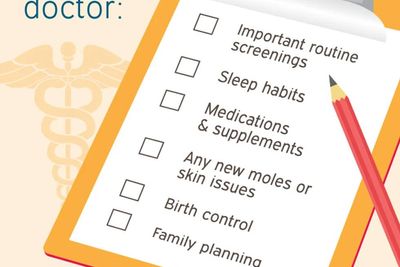As the old saying goes, prevention is the best medicine, so it's important to keep regular appointments where you can talk about things you've noticed and get screened for diseases and illnesses.
Before you head into your appointment, it's best to prepare yourself—not only with the information you'll need to provide your doctor, but with a list of questions to ask so you can take full advantage of your health care provider's knowledge for the benefit of your health. Here's a handy guide that should help you get ready for your visit.
What to bring
You don't necessarily have to bring anything physical to your appointment aside from your health insurance card, but unless you have everything memorized, it may help to create a couple of lists.
- List all of the medications you're taking, whether they're over-the-counter drugs, prescription medicines, vitamins or other supplements.
- Be prepared to tell your doctor about your medical history, including your family medical history, allergies and past and current health conditions.
What to ask yourself before you go
It helps to do a little self-evaluation before your appointment. To get a handle on what kinds of things you should ask your health care provider, ask yourself questions like:
- Do I have any concerns or symptoms that should be brought up?
- How can I best describe these issues to my health care provider?
- How long have I been experiencing these symptoms or concerns?
- Have I started taking any new medications or supplements?
- Are there any tests or medications I'd like to know more about?
What to ask your health care provider
Preparing yourself with a list of questions before your appointment can ensure that all the important topics are touched upon. Here are a few to start off with, but don't hesitate to ask more if you need clarification or think of something else.
- Do I need any routine tests or screenings, like a mammogram, Pap test, sexually transmitted disease tests, osteoporosis screening, colonoscopy or blood test?
- Do I have any new moles or suspicious spots on my skin?
- What treatments are recommended for any of the concerns or conditions I have? Are there particular benefits or risks involved?
- What are the side effects I should watch out for when taking the medications you've prescribed?
- Are there any additional resources I could check out to learn more about my medications, issues or conditions?
- Do I need a referral for a different kind of health care provider?
- Should I schedule a follow-up visit?
You should also ask your health care provider any questions you have about sleep habits, stress management, exercise regimens, diets, birth control and family planning. He or she can help you decide what's best for you.
After the appointment, be sure to keep your health care provider informed about any symptom changes, and don't be afraid to get back in touch with additional questions or concerns. Keep your follow-up visit and do your best to follow your health care provider's recommendations and advice.


